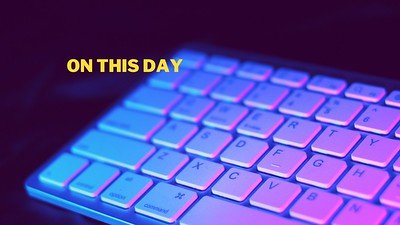An excellent observation is that even small changes can have profound effects.
Read MoreReview: The System: Who Owns the Internet, and How It Owns Us
This book will help teachers to address the parts of the Programme of Study concerned with computer systems, communications and online safety.
Read MoreOn this day: applying computational thinking in the "real world"
I don’t think I’ve come across any examples of how pupils might use computational thinking in a broader context, or how it applies beyond the relatively narrow confines of computer science.
Read MoreReview: Audio for Authors (Yes, it IS relevant for teachers!)
Many moons ago I started my own podcast. It was called Terry Freedman’s Education Technology podcast, and it consisted of useful hints and tips for teachers of Computing and related subjects. I have to say that I found it hard going.
Read MoreThe value of case studies
Could it be worth compiling case studies of success stories of people who have used education technology or completed a Computing course in your school?
Read MoreReview: A Student's Guide to Python for Physical Modelling
While this book is comprehensive, and gives instructions step by step, it is not what you might call an idiot’s guide.
Read MoreMy experiments with transcribing audio
I was surprised, at first, to discover that dictating articles is very easy. When I thought about it though, I realised that it should not have been surprising at all.
Read More12 ways to prepare for teaching Computing
If you're told you'll be teaching Computing from now on, but don't feel competent to do so, what practical steps can you take in order to get up and running? Here are 12 suggestions.
Read More4 Ways to come up with innovative ideas for teaching Computing
To borrow from Dr Johnson, I find that most innovative ideas in Computing I read about are both new and exciting. Unfortunately, the ones that are new are not exciting, and the ones that are exciting are not new. It’s all very well “pushing the boundaries”, but all that does is give you more of the same.
Read MoreAnother criterion of IT project success: nothing
You can end up being so focused on measurable criteria that you miss really important stuff.
Read MoreWhy Is The Curriculum Like a bus Timetable (updated)?
I’ve observed lessons in which the teacher feels obliged to race on in order to get through the scheme of work. That results in some, if not all, students being left behind.
Read MoreQuick looks -- The System: Who owns the internet, and how it owns us
[Links corrected!] My question is: will this be of any use to someone teaching computing, or to students learning computing?
Read MoreReview: Atlas of AI
This ‘Atlas’ takes students deep into the field of artificial intelligence which, according to Crawford, is actually neither artificial, nor intelligent.
Read MoreHow to use pupils to evaluate education technology resources
What people say, and what they do, can be two different things. I have had a situation in which pupils tell me materials are “boring”, having just spent 45 minutes working intensively with those materials without a break!
Read MoreIntroducing kids to programming via a spreadsheet sweet shop
Spreadsheets are dead, right? Wrong! Not only are they a great tool for teaching programming concepts, they can easily be addressed under the Computing programme of study.
Read MoreWhy your Computing department needs a library
Like all educators, computing specialists should read more than just material directly related to what they’re teaching. It’s about being, and being seen to be, an expert in the subject.
Read MoreTo be an ed tech maverick, you need to be sensible (updated)
What does it mean to be a maverick? To me, it means not going along with the general consensus about something, just because it’s a consensus. There is always a natural tendency to think “all those people can’t be wrong”, or “there’s no smoke without fire”, but in fact all those people could be wrong and there could be smoke without fire.
Read MoreBook reviewing, by Terry Freedman
6 Graphic "Novels" for Computing teachers
If you’re looking for some good reading material, these “graphic novel” books may be just what you need. They’re all non-fiction, hence the quotation marks.
Read More10 Characteristics of a good Computing Scheme of Work
*UPDATED* What are the attributes of a good ICT and Computing scheme of work? Here's the list of characteristics I've always looked for.
Read MoreTiny Noticeable Things
The following list contains examples of things I did in school that made life much easier for those on the receiving end. What might you do?
Read More




